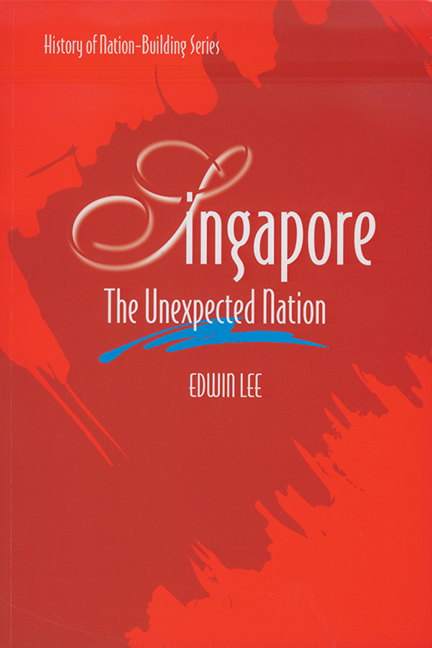Book contents
- Frontmatter
- Dedication
- Contents
- Preface
- Introduction by Wang Gungwu
- Chapter One Beginnings: From Temasek to Singapore
- Chapter Two Race, History and Nationalism
- Chapter Three Contestants and Contesting Visions
- Chapter Four The Accidental Chief Minister
- Chapter Five The Terminal Chief Minister
- Chapter Six The Embattled Prime Minister
- Chapter Seven Merger: Contesting Ownership and Principles
- Chapter Eight Terms of Disendearment
- Chapter Nine Dare to be Equal
- Chapter Ten The Way to Survive
- Chapter Eleven National Service: The Price of Independence
- Chapter Twelve Politics of Education
- Chapter Thirteen Home Ownership, National Stability and the New Middle Classes
- Chapter Fourteen University and Nation
- Chapter Fifteen Toh's Nation-Building Thrust
- Chapter Sixteen Nantah: Between Community and Nation
- Chapter Seventeen Self-Renewal: Talents for a Tough Act
- Chapter Eighteen The Consensual Prime Minister
- Chapter Nineteen Confucianism, Christianity, Chineseness
- Chapter Twenty Singapore Dreams, Singapore Dilemmas
- Chapter Twenty-One The Hyphenated Singaporean
- Chapter Twenty-Two The Unexpected Nation
- Bibliographical Note
- Index
- The Author
Chapter Twenty-One - The Hyphenated Singaporean
Published online by Cambridge University Press: 21 October 2015
- Frontmatter
- Dedication
- Contents
- Preface
- Introduction by Wang Gungwu
- Chapter One Beginnings: From Temasek to Singapore
- Chapter Two Race, History and Nationalism
- Chapter Three Contestants and Contesting Visions
- Chapter Four The Accidental Chief Minister
- Chapter Five The Terminal Chief Minister
- Chapter Six The Embattled Prime Minister
- Chapter Seven Merger: Contesting Ownership and Principles
- Chapter Eight Terms of Disendearment
- Chapter Nine Dare to be Equal
- Chapter Ten The Way to Survive
- Chapter Eleven National Service: The Price of Independence
- Chapter Twelve Politics of Education
- Chapter Thirteen Home Ownership, National Stability and the New Middle Classes
- Chapter Fourteen University and Nation
- Chapter Fifteen Toh's Nation-Building Thrust
- Chapter Sixteen Nantah: Between Community and Nation
- Chapter Seventeen Self-Renewal: Talents for a Tough Act
- Chapter Eighteen The Consensual Prime Minister
- Chapter Nineteen Confucianism, Christianity, Chineseness
- Chapter Twenty Singapore Dreams, Singapore Dilemmas
- Chapter Twenty-One The Hyphenated Singaporean
- Chapter Twenty-Two The Unexpected Nation
- Bibliographical Note
- Index
- The Author
Summary
We are not just another country. We are a very unlikely country,” Prime Minister Lee Kuan Yew said in 1987, with reference to the danger of politicizing religion in Singapore. In 1989, when Lee was asked in a Newsweek interview: “What have been your biggest frustrations?”, he replied:
First and foremost, the fact that we failed in getting Malaysia to succeed with us as one nation. We didn't want an independent Singapore — it went against our reason and our logic on how to build a stable long-term future as a multiracial community. We considered Singapore not viable. But we were forced to make it viable.
The British had also badly wanted Malaysia to succeed. Post-war, the British had tried to broker a multiracial political fusion in Malaya, but had had to grant Malaya independence in 1957 without achieving it. Malaysia seemed to be a second chance for the British to try again. Lord Head, the British high commissioner in Malaysia, the relevant and anxious British Government offices, and Sir Robert Menzies, the Australian prime minister, all urged the same course: that pressure be put on the Tunku “for a more inclusive national government”, one that would have leaders from Singapore, Sabah, and Sarawak. But British and Commonwealth pressure could not prevail over the internal pressure the Tunku faced from Malay nationalism. The power of Malay nationalism: it was the same story as before, but this time, Lee Kuan Yew shared the melancholy of the British failure. For it prognosticated the expulsion of Singapore, which Lee said he would look back on each time as “a moment of anguish”.
However, looking on the bright side, he did not have to worry anymore about the Tunku or the ultra Malay nationalists. The threat of being displaced or detained no longer hung over him. He was free from all that now. He had, in fact, come out of Malaysia stronger than when he entered it. Merger, as he had correctly judged, was the perfect issue on which to defeat the communists.
- Type
- Chapter
- Information
- SingaporeThe Unexpected Nation, pp. 597 - 632Publisher: ISEAS–Yusof Ishak InstitutePrint publication year: 2008

